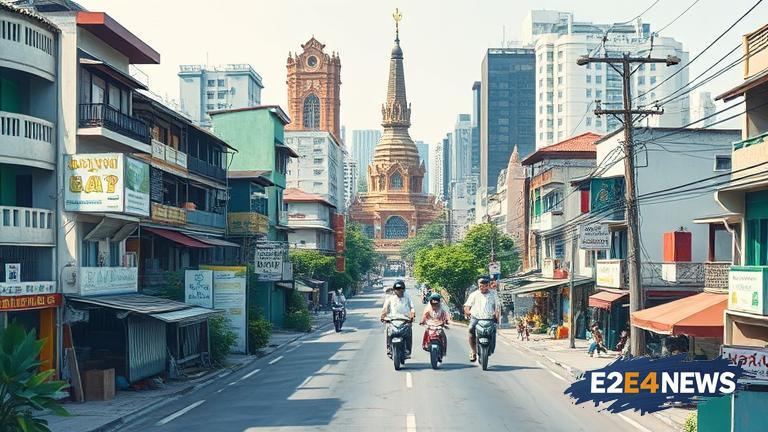Bangkok, the capital city of Thailand, is facing numerous challenges in its urban development, including traffic congestion, air pollution, and inadequate public transportation. The city’s rapid growth has put a strain on its infrastructure, leading to a decline in the quality of life for its residents. To address these issues, a city-wide approach is necessary, involving all stakeholders, including the government, private sector, and civil society. This approach should prioritize sustainable development, taking into account the environmental, social, and economic impacts of urban planning decisions. One of the key areas of focus should be the development of a comprehensive public transportation system, including buses, trains, and bike lanes, to reduce reliance on personal vehicles and decrease air pollution. Additionally, the city should invest in green spaces, such as parks and gardens, to mitigate the urban heat island effect and improve air quality. The city’s waste management system also needs to be overhauled, with a focus on recycling and reducing waste sent to landfills. Furthermore, the city should prioritize the development of affordable housing, to address the issue of urban poverty and inequality. The government should also implement policies to promote sustainable urban planning, such as zoning regulations and building codes, to ensure that new developments are environmentally friendly and socially responsible. Moreover, the city should engage with its residents, through public participation and consultation, to ensure that their needs and concerns are taken into account in the urban planning process. This can be achieved through the use of technology, such as online platforms and mobile apps, to facilitate communication and feedback. The private sector also has a crucial role to play in Bangkok’s city-wide revitalization, through investments in sustainable infrastructure and technologies. For example, companies can invest in renewable energy, such as solar and wind power, to reduce the city’s reliance on fossil fuels. Moreover, the city should promote sustainable tourism, by encouraging visitors to use public transportation and respect the city’s environment and culture. The city’s education system also needs to be strengthened, to provide residents with the skills and knowledge necessary to participate in the sustainable development of the city. This can be achieved through the development of vocational training programs and workshops, focused on sustainable urban planning and management. Furthermore, the city should establish partnerships with international organizations and cities, to share best practices and learn from their experiences in sustainable urban development. The city’s revitalization should also prioritize the preservation of its cultural heritage, including its historic buildings and traditional communities. This can be achieved through the development of cultural tourism initiatives, which promote the city’s unique culture and history. In conclusion, Bangkok’s city-wide revitalization requires a comprehensive and sustainable approach, involving all stakeholders and prioritizing the environmental, social, and economic well-being of its residents. By working together, the city can create a better future for its residents, and become a model for sustainable urban development in the region. The city’s residents, businesses, and government must work together to address the challenges facing the city, and create a more sustainable, equitable, and prosperous future for all. This will require a long-term commitment to sustainable development, and a willingness to invest in the city’s infrastructure, education system, and cultural heritage. Ultimately, the success of Bangkok’s city-wide revitalization will depend on the ability of its stakeholders to work together, and to prioritize the well-being of the city and its residents. By doing so, Bangkok can become a thriving, sustainable, and resilient city, and a model for urban development in the region. The city’s revitalization should also be guided by the principles of transparency, accountability, and participation, to ensure that all stakeholders are involved in the decision-making process, and that the city’s development is equitable and just. The city’s government should also establish a monitoring and evaluation system, to track the progress of the city’s revitalization, and to make adjustments as necessary. This will require the collection and analysis of data, on the city’s environmental, social, and economic indicators, to inform decision-making and ensure that the city is on track to meet its sustainable development goals.
